Services and Marketing Relationship: Qantas Case Study Analysis
VerifiedAdded on 2020/03/23
|7
|1308
|70
Report
AI Summary
This report analyzes the services and marketing relationship, focusing on the airline industry and the Qantas case study. It identifies the determinants of customer satisfaction, highlighting the importance of service quality, in-flight entertainment, and pricing. The report compares Qantas's performance to Virgin Australia, emphasizing Qantas's higher customer satisfaction scores. It explores theoretical models of service quality, including the three-component model and the confirmation/disconfirmation theory. Furthermore, the report proposes a service recovery plan for Qantas to address challenges such as industrial disputes and fluctuating fuel prices. The plan incorporates the justice theory's dimensions—distributive, procedural, and interactional justice—to enhance customer loyalty and address financial pressures. The analysis includes references to relevant research and guidelines, providing a comprehensive understanding of service quality and marketing strategies within the airline sector.
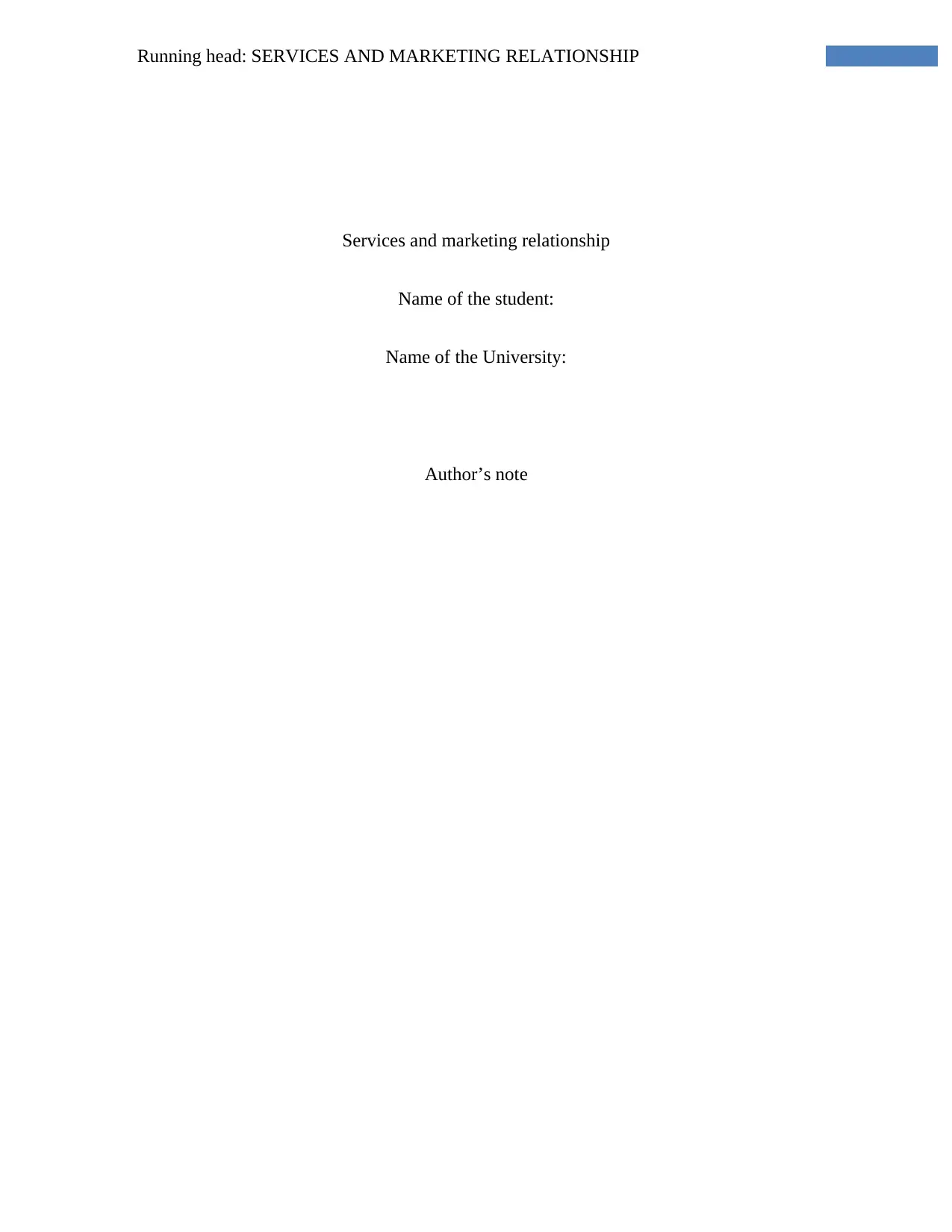
Running head: SERVICES AND MARKETING RELATIONSHIP
Services and marketing relationship
Name of the student:
Name of the University:
Author’s note
Services and marketing relationship
Name of the student:
Name of the University:
Author’s note
Paraphrase This Document
Need a fresh take? Get an instant paraphrase of this document with our AI Paraphraser
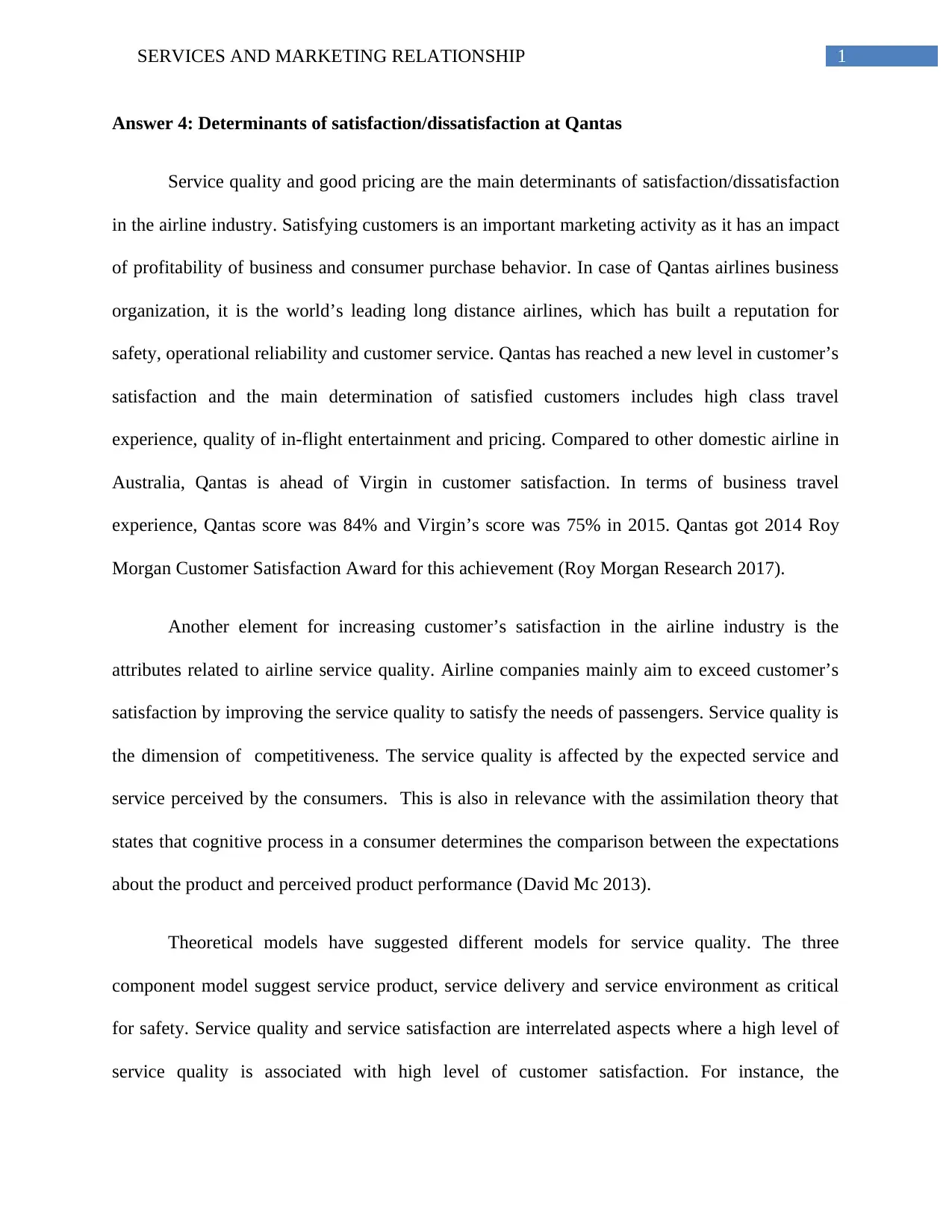
1SERVICES AND MARKETING RELATIONSHIP
Answer 4: Determinants of satisfaction/dissatisfaction at Qantas
Service quality and good pricing are the main determinants of satisfaction/dissatisfaction
in the airline industry. Satisfying customers is an important marketing activity as it has an impact
of profitability of business and consumer purchase behavior. In case of Qantas airlines business
organization, it is the world’s leading long distance airlines, which has built a reputation for
safety, operational reliability and customer service. Qantas has reached a new level in customer’s
satisfaction and the main determination of satisfied customers includes high class travel
experience, quality of in-flight entertainment and pricing. Compared to other domestic airline in
Australia, Qantas is ahead of Virgin in customer satisfaction. In terms of business travel
experience, Qantas score was 84% and Virgin’s score was 75% in 2015. Qantas got 2014 Roy
Morgan Customer Satisfaction Award for this achievement (Roy Morgan Research 2017).
Another element for increasing customer’s satisfaction in the airline industry is the
attributes related to airline service quality. Airline companies mainly aim to exceed customer’s
satisfaction by improving the service quality to satisfy the needs of passengers. Service quality is
the dimension of competitiveness. The service quality is affected by the expected service and
service perceived by the consumers. This is also in relevance with the assimilation theory that
states that cognitive process in a consumer determines the comparison between the expectations
about the product and perceived product performance (David Mc 2013).
Theoretical models have suggested different models for service quality. The three
component model suggest service product, service delivery and service environment as critical
for safety. Service quality and service satisfaction are interrelated aspects where a high level of
service quality is associated with high level of customer satisfaction. For instance, the
Answer 4: Determinants of satisfaction/dissatisfaction at Qantas
Service quality and good pricing are the main determinants of satisfaction/dissatisfaction
in the airline industry. Satisfying customers is an important marketing activity as it has an impact
of profitability of business and consumer purchase behavior. In case of Qantas airlines business
organization, it is the world’s leading long distance airlines, which has built a reputation for
safety, operational reliability and customer service. Qantas has reached a new level in customer’s
satisfaction and the main determination of satisfied customers includes high class travel
experience, quality of in-flight entertainment and pricing. Compared to other domestic airline in
Australia, Qantas is ahead of Virgin in customer satisfaction. In terms of business travel
experience, Qantas score was 84% and Virgin’s score was 75% in 2015. Qantas got 2014 Roy
Morgan Customer Satisfaction Award for this achievement (Roy Morgan Research 2017).
Another element for increasing customer’s satisfaction in the airline industry is the
attributes related to airline service quality. Airline companies mainly aim to exceed customer’s
satisfaction by improving the service quality to satisfy the needs of passengers. Service quality is
the dimension of competitiveness. The service quality is affected by the expected service and
service perceived by the consumers. This is also in relevance with the assimilation theory that
states that cognitive process in a consumer determines the comparison between the expectations
about the product and perceived product performance (David Mc 2013).
Theoretical models have suggested different models for service quality. The three
component model suggest service product, service delivery and service environment as critical
for safety. Service quality and service satisfaction are interrelated aspects where a high level of
service quality is associated with high level of customer satisfaction. For instance, the
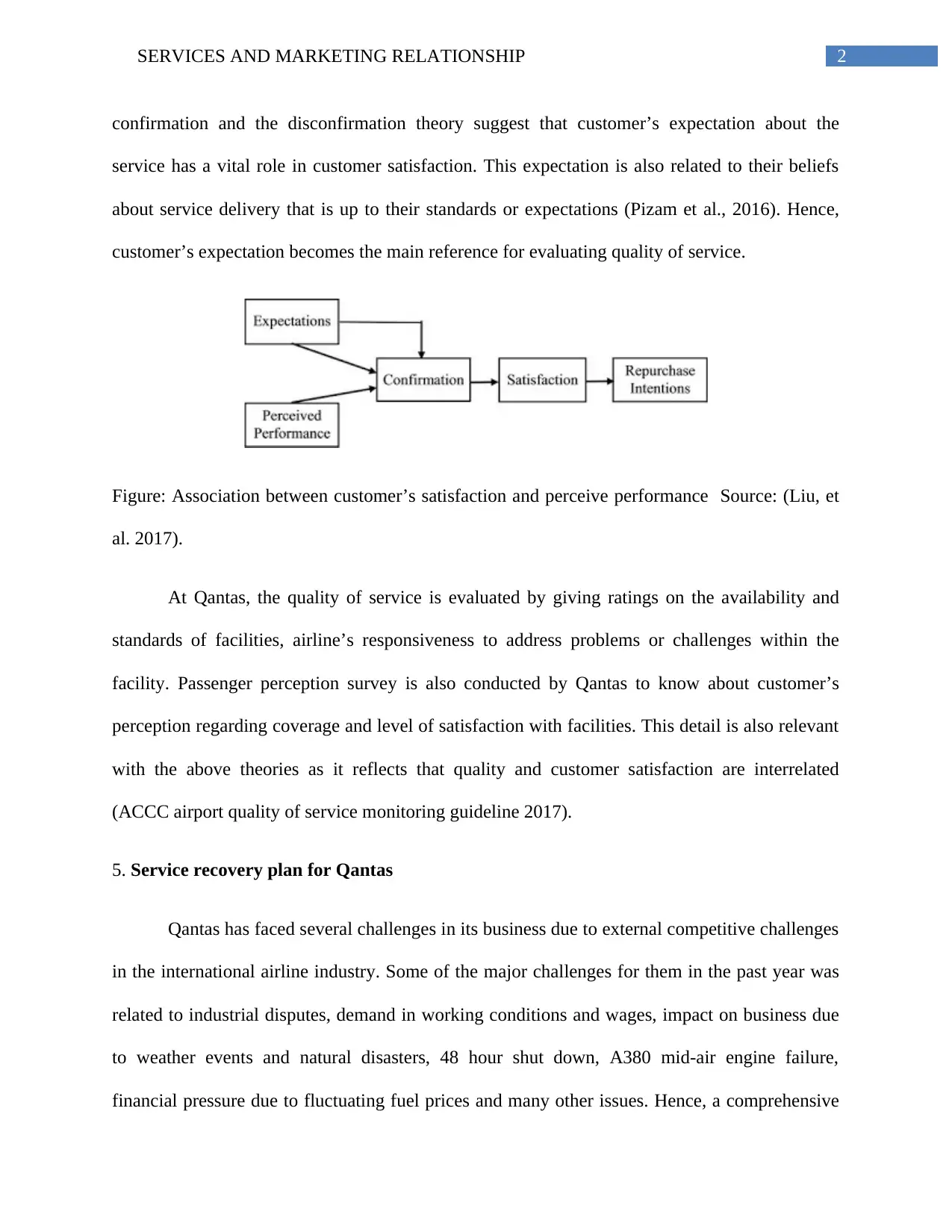
2SERVICES AND MARKETING RELATIONSHIP
confirmation and the disconfirmation theory suggest that customer’s expectation about the
service has a vital role in customer satisfaction. This expectation is also related to their beliefs
about service delivery that is up to their standards or expectations (Pizam et al., 2016). Hence,
customer’s expectation becomes the main reference for evaluating quality of service.
Figure: Association between customer’s satisfaction and perceive performance Source: (Liu, et
al. 2017).
At Qantas, the quality of service is evaluated by giving ratings on the availability and
standards of facilities, airline’s responsiveness to address problems or challenges within the
facility. Passenger perception survey is also conducted by Qantas to know about customer’s
perception regarding coverage and level of satisfaction with facilities. This detail is also relevant
with the above theories as it reflects that quality and customer satisfaction are interrelated
(ACCC airport quality of service monitoring guideline 2017).
5. Service recovery plan for Qantas
Qantas has faced several challenges in its business due to external competitive challenges
in the international airline industry. Some of the major challenges for them in the past year was
related to industrial disputes, demand in working conditions and wages, impact on business due
to weather events and natural disasters, 48 hour shut down, A380 mid-air engine failure,
financial pressure due to fluctuating fuel prices and many other issues. Hence, a comprehensive
confirmation and the disconfirmation theory suggest that customer’s expectation about the
service has a vital role in customer satisfaction. This expectation is also related to their beliefs
about service delivery that is up to their standards or expectations (Pizam et al., 2016). Hence,
customer’s expectation becomes the main reference for evaluating quality of service.
Figure: Association between customer’s satisfaction and perceive performance Source: (Liu, et
al. 2017).
At Qantas, the quality of service is evaluated by giving ratings on the availability and
standards of facilities, airline’s responsiveness to address problems or challenges within the
facility. Passenger perception survey is also conducted by Qantas to know about customer’s
perception regarding coverage and level of satisfaction with facilities. This detail is also relevant
with the above theories as it reflects that quality and customer satisfaction are interrelated
(ACCC airport quality of service monitoring guideline 2017).
5. Service recovery plan for Qantas
Qantas has faced several challenges in its business due to external competitive challenges
in the international airline industry. Some of the major challenges for them in the past year was
related to industrial disputes, demand in working conditions and wages, impact on business due
to weather events and natural disasters, 48 hour shut down, A380 mid-air engine failure,
financial pressure due to fluctuating fuel prices and many other issues. Hence, a comprehensive
⊘ This is a preview!⊘
Do you want full access?
Subscribe today to unlock all pages.

Trusted by 1+ million students worldwide
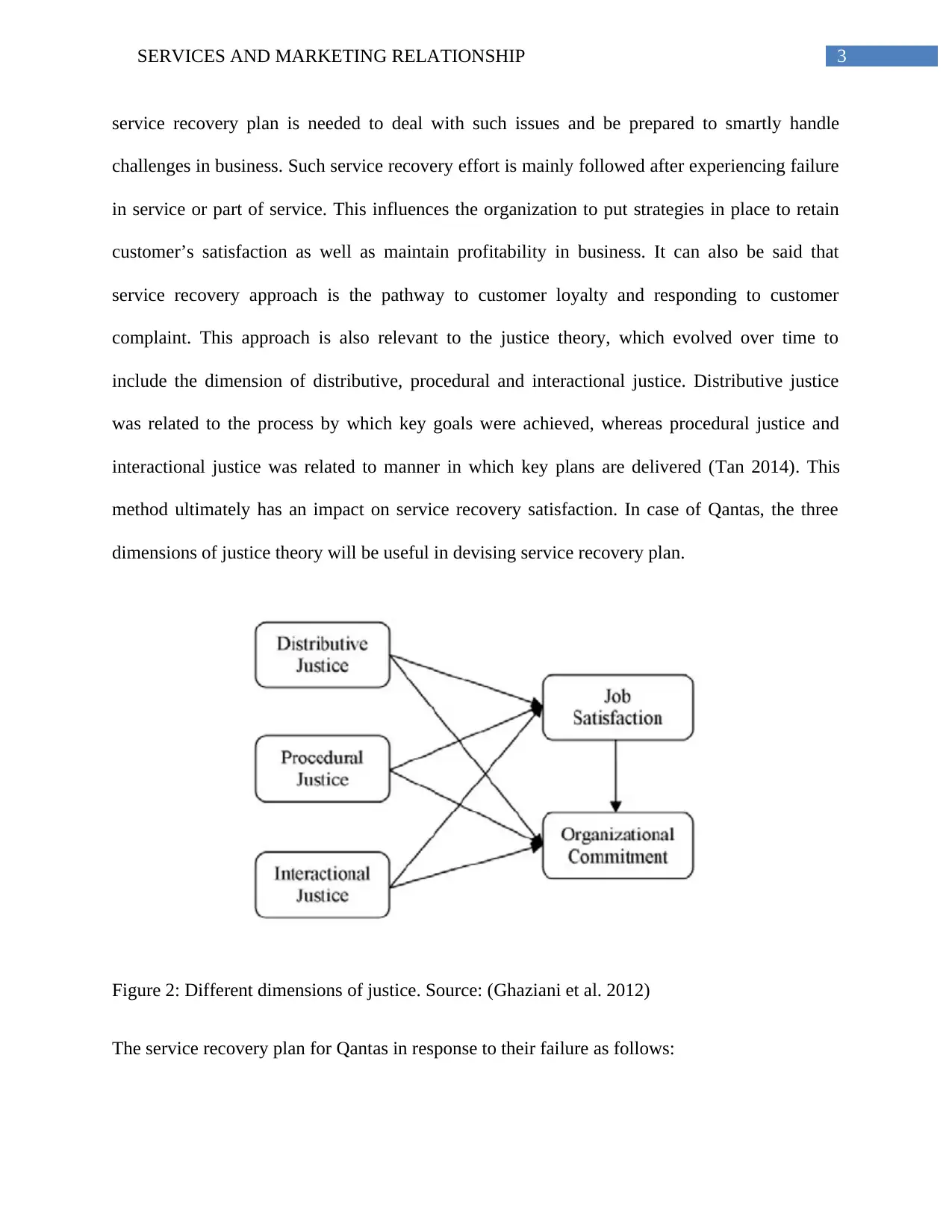
3SERVICES AND MARKETING RELATIONSHIP
service recovery plan is needed to deal with such issues and be prepared to smartly handle
challenges in business. Such service recovery effort is mainly followed after experiencing failure
in service or part of service. This influences the organization to put strategies in place to retain
customer’s satisfaction as well as maintain profitability in business. It can also be said that
service recovery approach is the pathway to customer loyalty and responding to customer
complaint. This approach is also relevant to the justice theory, which evolved over time to
include the dimension of distributive, procedural and interactional justice. Distributive justice
was related to the process by which key goals were achieved, whereas procedural justice and
interactional justice was related to manner in which key plans are delivered (Tan 2014). This
method ultimately has an impact on service recovery satisfaction. In case of Qantas, the three
dimensions of justice theory will be useful in devising service recovery plan.
Figure 2: Different dimensions of justice. Source: (Ghaziani et al. 2012)
The service recovery plan for Qantas in response to their failure as follows:
service recovery plan is needed to deal with such issues and be prepared to smartly handle
challenges in business. Such service recovery effort is mainly followed after experiencing failure
in service or part of service. This influences the organization to put strategies in place to retain
customer’s satisfaction as well as maintain profitability in business. It can also be said that
service recovery approach is the pathway to customer loyalty and responding to customer
complaint. This approach is also relevant to the justice theory, which evolved over time to
include the dimension of distributive, procedural and interactional justice. Distributive justice
was related to the process by which key goals were achieved, whereas procedural justice and
interactional justice was related to manner in which key plans are delivered (Tan 2014). This
method ultimately has an impact on service recovery satisfaction. In case of Qantas, the three
dimensions of justice theory will be useful in devising service recovery plan.
Figure 2: Different dimensions of justice. Source: (Ghaziani et al. 2012)
The service recovery plan for Qantas in response to their failure as follows:
Paraphrase This Document
Need a fresh take? Get an instant paraphrase of this document with our AI Paraphraser
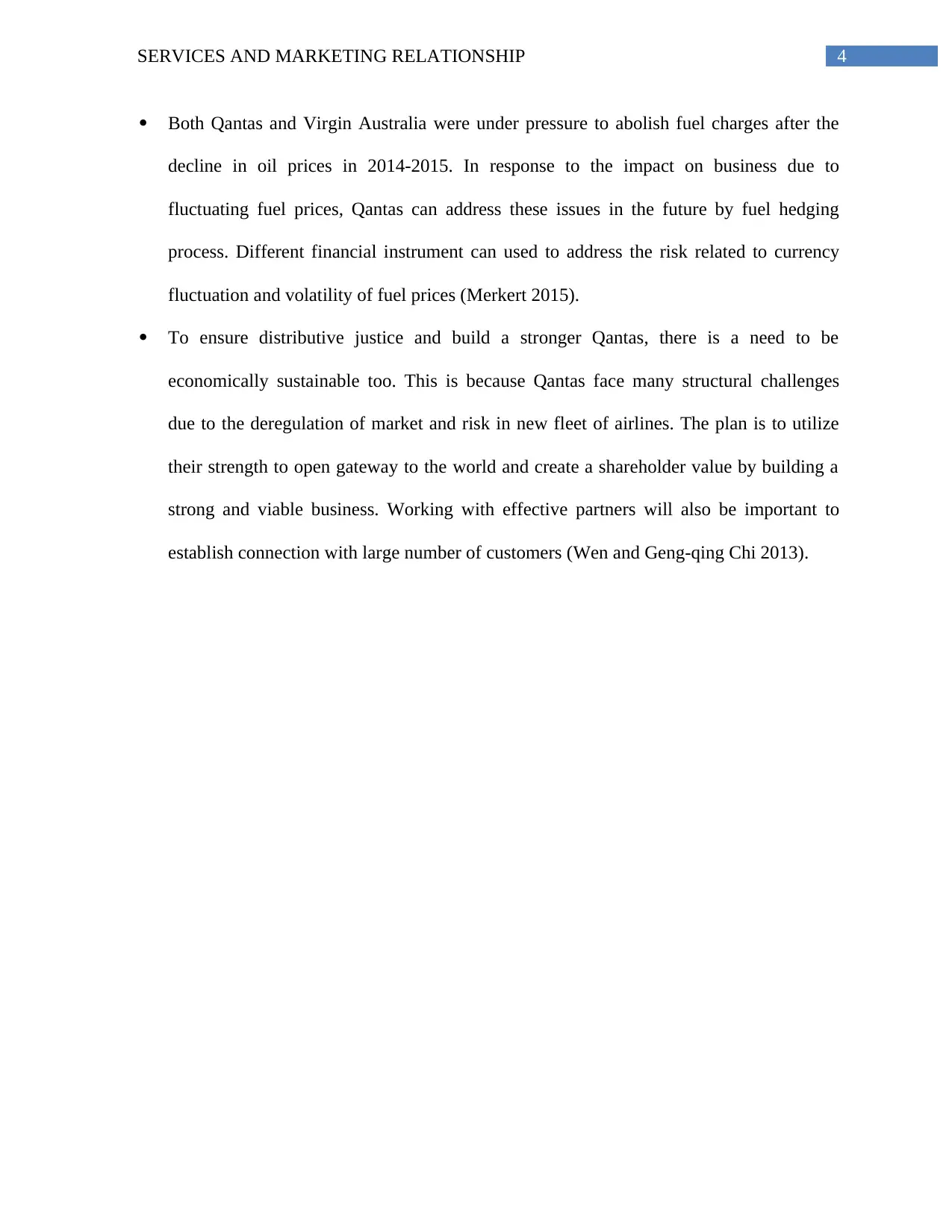
4SERVICES AND MARKETING RELATIONSHIP
Both Qantas and Virgin Australia were under pressure to abolish fuel charges after the
decline in oil prices in 2014-2015. In response to the impact on business due to
fluctuating fuel prices, Qantas can address these issues in the future by fuel hedging
process. Different financial instrument can used to address the risk related to currency
fluctuation and volatility of fuel prices (Merkert 2015).
To ensure distributive justice and build a stronger Qantas, there is a need to be
economically sustainable too. This is because Qantas face many structural challenges
due to the deregulation of market and risk in new fleet of airlines. The plan is to utilize
their strength to open gateway to the world and create a shareholder value by building a
strong and viable business. Working with effective partners will also be important to
establish connection with large number of customers (Wen and Geng-qing Chi 2013).
Both Qantas and Virgin Australia were under pressure to abolish fuel charges after the
decline in oil prices in 2014-2015. In response to the impact on business due to
fluctuating fuel prices, Qantas can address these issues in the future by fuel hedging
process. Different financial instrument can used to address the risk related to currency
fluctuation and volatility of fuel prices (Merkert 2015).
To ensure distributive justice and build a stronger Qantas, there is a need to be
economically sustainable too. This is because Qantas face many structural challenges
due to the deregulation of market and risk in new fleet of airlines. The plan is to utilize
their strength to open gateway to the world and create a shareholder value by building a
strong and viable business. Working with effective partners will also be important to
establish connection with large number of customers (Wen and Geng-qing Chi 2013).
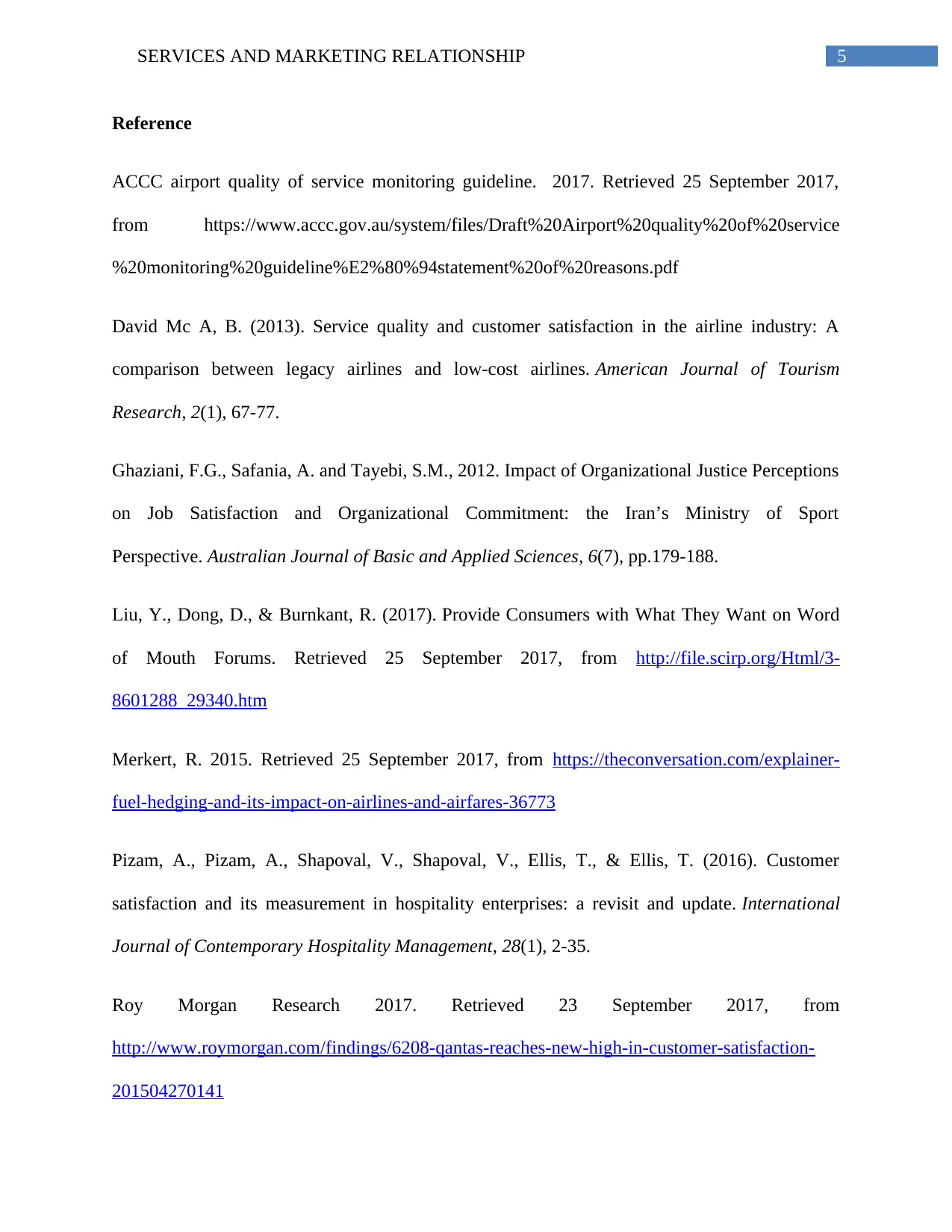
5SERVICES AND MARKETING RELATIONSHIP
Reference
ACCC airport quality of service monitoring guideline. 2017. Retrieved 25 September 2017,
from https://www.accc.gov.au/system/files/Draft%20Airport%20quality%20of%20service
%20monitoring%20guideline%E2%80%94statement%20of%20reasons.pdf
David Mc A, B. (2013). Service quality and customer satisfaction in the airline industry: A
comparison between legacy airlines and low-cost airlines. American Journal of Tourism
Research, 2(1), 67-77.
Ghaziani, F.G., Safania, A. and Tayebi, S.M., 2012. Impact of Organizational Justice Perceptions
on Job Satisfaction and Organizational Commitment: the Iran’s Ministry of Sport
Perspective. Australian Journal of Basic and Applied Sciences, 6(7), pp.179-188.
Liu, Y., Dong, D., & Burnkant, R. (2017). Provide Consumers with What They Want on Word
of Mouth Forums. Retrieved 25 September 2017, from http://file.scirp.org/Html/3-
8601288_29340.htm
Merkert, R. 2015. Retrieved 25 September 2017, from https://theconversation.com/explainer-
fuel-hedging-and-its-impact-on-airlines-and-airfares-36773
Pizam, A., Pizam, A., Shapoval, V., Shapoval, V., Ellis, T., & Ellis, T. (2016). Customer
satisfaction and its measurement in hospitality enterprises: a revisit and update. International
Journal of Contemporary Hospitality Management, 28(1), 2-35.
Roy Morgan Research 2017. Retrieved 23 September 2017, from
http://www.roymorgan.com/findings/6208-qantas-reaches-new-high-in-customer-satisfaction-
201504270141
Reference
ACCC airport quality of service monitoring guideline. 2017. Retrieved 25 September 2017,
from https://www.accc.gov.au/system/files/Draft%20Airport%20quality%20of%20service
%20monitoring%20guideline%E2%80%94statement%20of%20reasons.pdf
David Mc A, B. (2013). Service quality and customer satisfaction in the airline industry: A
comparison between legacy airlines and low-cost airlines. American Journal of Tourism
Research, 2(1), 67-77.
Ghaziani, F.G., Safania, A. and Tayebi, S.M., 2012. Impact of Organizational Justice Perceptions
on Job Satisfaction and Organizational Commitment: the Iran’s Ministry of Sport
Perspective. Australian Journal of Basic and Applied Sciences, 6(7), pp.179-188.
Liu, Y., Dong, D., & Burnkant, R. (2017). Provide Consumers with What They Want on Word
of Mouth Forums. Retrieved 25 September 2017, from http://file.scirp.org/Html/3-
8601288_29340.htm
Merkert, R. 2015. Retrieved 25 September 2017, from https://theconversation.com/explainer-
fuel-hedging-and-its-impact-on-airlines-and-airfares-36773
Pizam, A., Pizam, A., Shapoval, V., Shapoval, V., Ellis, T., & Ellis, T. (2016). Customer
satisfaction and its measurement in hospitality enterprises: a revisit and update. International
Journal of Contemporary Hospitality Management, 28(1), 2-35.
Roy Morgan Research 2017. Retrieved 23 September 2017, from
http://www.roymorgan.com/findings/6208-qantas-reaches-new-high-in-customer-satisfaction-
201504270141
⊘ This is a preview!⊘
Do you want full access?
Subscribe today to unlock all pages.

Trusted by 1+ million students worldwide
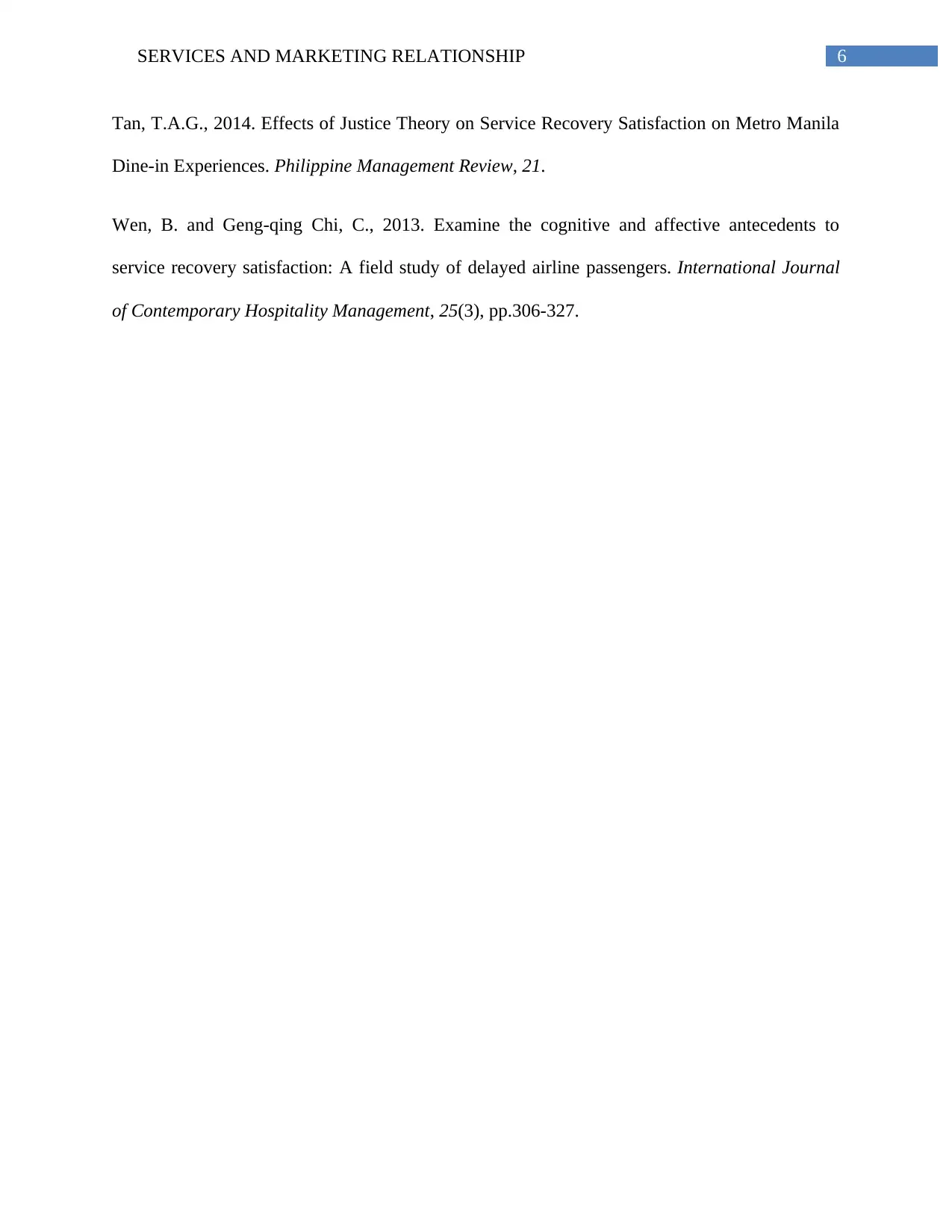
6SERVICES AND MARKETING RELATIONSHIP
Tan, T.A.G., 2014. Effects of Justice Theory on Service Recovery Satisfaction on Metro Manila
Dine-in Experiences. Philippine Management Review, 21.
Wen, B. and Geng-qing Chi, C., 2013. Examine the cognitive and affective antecedents to
service recovery satisfaction: A field study of delayed airline passengers. International Journal
of Contemporary Hospitality Management, 25(3), pp.306-327.
Tan, T.A.G., 2014. Effects of Justice Theory on Service Recovery Satisfaction on Metro Manila
Dine-in Experiences. Philippine Management Review, 21.
Wen, B. and Geng-qing Chi, C., 2013. Examine the cognitive and affective antecedents to
service recovery satisfaction: A field study of delayed airline passengers. International Journal
of Contemporary Hospitality Management, 25(3), pp.306-327.
1 out of 7
Related Documents
Your All-in-One AI-Powered Toolkit for Academic Success.
+13062052269
info@desklib.com
Available 24*7 on WhatsApp / Email
![[object Object]](/_next/static/media/star-bottom.7253800d.svg)
Unlock your academic potential
Copyright © 2020–2026 A2Z Services. All Rights Reserved. Developed and managed by ZUCOL.





